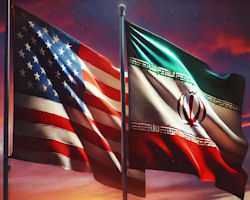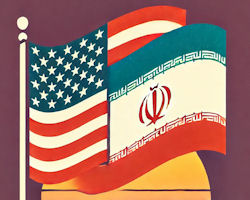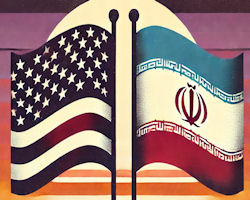Iran-US Relations
 Great Satan is the semi-official Iranian nickname for the USA. The term was first used by Imam Khomeini in his speech on Nov, 5, 1979 to describe the U.S. atrocities towards the Iran. In 1953 the CIA overthrew the democratically elected Mohammed Mosaddegh in a military coup, after Nationalization of Oil. The CIA replaced him with a dictator, the Shah of Iran and installed a notorious secret police called SAVAK. With US encouragement, Saddam Hussein invaded Iran in 1980. During this costly eight-year war, the USA built up Hussein’s forces with sophisticated arms, intelligence, training and financial backing. This cemented Saddam Hussein’s power at home, allowing him to crush the many internal rebellions that erupted from time to time, sometimes with chemical bombs. Use of the term at rallies is often accompanied by shouts of "Marg bar Amrika!" ("Death to America" is an inexact translation of "Marg Bar Amrika", but is supposed to mean "Down with America").
Great Satan is the semi-official Iranian nickname for the USA. The term was first used by Imam Khomeini in his speech on Nov, 5, 1979 to describe the U.S. atrocities towards the Iran. In 1953 the CIA overthrew the democratically elected Mohammed Mosaddegh in a military coup, after Nationalization of Oil. The CIA replaced him with a dictator, the Shah of Iran and installed a notorious secret police called SAVAK. With US encouragement, Saddam Hussein invaded Iran in 1980. During this costly eight-year war, the USA built up Hussein’s forces with sophisticated arms, intelligence, training and financial backing. This cemented Saddam Hussein’s power at home, allowing him to crush the many internal rebellions that erupted from time to time, sometimes with chemical bombs. Use of the term at rallies is often accompanied by shouts of "Marg bar Amrika!" ("Death to America" is an inexact translation of "Marg Bar Amrika", but is supposed to mean "Down with America").
"We are not looking to do damage to Iran but they have -- they can't have a nuclear weapon. You know my terms are easy. They can't have a nuclear weapon. I would like them to be a very successful country but they just cannot have a nuclear." Trump said after casting his ballot, 05 November 2024. Trump’s unpredictable behaviour is likely to make many world capitals uneasy about his victory. Since Iran in particular was the main target of his previous administration’s foreign policy, with the latter withdrawing from the Iranian nuclear agreement and re-imposing sanctions under the maximum pressure policy, there is a lot of uncertainty and anticipation regarding the future of relations between the two countries.
Trump will not return to the nuclear agreement, because he is the one who withdrew from it, especially since the people Trump appoints to his administration are chosen from the hard-right anti-Iranian group. In light of Trump's previous moves, it seems that merely talking about nuclear negotiations between Iran and the Trump administration is a difficult matter. It is natural for Trump to seek greater gains in the nuclear file by increasing economic and political pressure on Iran's allies in the region, imposing permanent restrictions on the Iranian nuclear program, and expanding the scope of negotiations to include military and regional files. He concluded that these moves could lead to an escalation of the level of tension in the region, and may push Iran to increase the level of uranium enrichment and reduce its cooperation with the International Atomic Energy Agency.
With the arrival of Trump, Israeli Prime Minister Benjamin Netanyahu will be able to move more freely in order to achieve the system preferred by Israel in the region, and thus, he will accelerate the achievement of the American-Israeli system in the region, with a focus on weakening Iran and the axis of resistance. Trump would support an Israeli attack on Iranian nuclear facilities , as he had previously stated this and expressed his dissatisfaction with current US President Joe Biden ’s pressure on Netanyahu not to attack Iranian nuclear facilities.
Trump likely wouldn’t try to put guardrails on Israel. “That’s the craziest thing I’ve ever heard,” Trump told Fox News last month in response to Biden saying Israel shouldn’t target Iran’s nuclear sites. “That was the craziest answer because, you know what? Soon, they’re going to have nuclear weapons. And then you’re going to have problems.” This according to Robbie Gramer and Eric Bazail-Eimil, writing for Poltico, 09 November 2024. “Tightening the economic noose around Iran is going to be a day one foreign policy priority to start cleaning up Biden’s Middle East mess,” said one former Trump official.
"The former officials said the Trump transition team is already talking through plans to unleash a new wave of harsh economic sanctions on Iran and work to cut off its oil exports all while beefing up support for Israel. They said Trump would revamp his so-called maximum pressure strategy of working to isolate Iran, ramp up economic pressure and maintain a credible threat of military force as a deterrent."
 "Brian Hook, who is leading the Trump campaign’s State Department transition team and helped run Trump’s Iran policy in his first term, touted the importance of maintaining a military threat against Iran while stressing that Trump has “no interest in regime change” in Iran in an interview with CNN on Thursday.“If nobody believes you have a credible threat of military force, then you’re going to lose deterrence,” Hook said."
"Brian Hook, who is leading the Trump campaign’s State Department transition team and helped run Trump’s Iran policy in his first term, touted the importance of maintaining a military threat against Iran while stressing that Trump has “no interest in regime change” in Iran in an interview with CNN on Thursday.“If nobody believes you have a credible threat of military force, then you’re going to lose deterrence,” Hook said."
The appointment of Brian Hook was one of Trump’s first campaign decisions following his election victory. Hook served as special envoy for Iran in the first Trump administration, and has been known for his strong stance against Iran since the beginning of his political career under former President George W. Bush. Hook engineered the "maximum pressure policy" toward Iran during Trump's first term, including implementing his proposals and advice that the United States should withdraw from the nuclear agreement signed by the Democratic administration of Barack Obama with Iran in 2015 with the participation of the five major countries: China, Russia, France, Britain, and Germany.
Hook was also a key member of the US team responsible for planning and implementing the Abraham Accords , which normalized Israel’s relations with Arab states such as the United Arab Emirates, Bahrain, Morocco and Sudan. Hook is considered one of the first Trump administration’s most pro-Israel officials. Hook is widely expected to be given a key position at the State Department or the National Security Council, sending an early Trump message of a tougher stance on Iran.
Trump believed the United States must prevent Iran from obtaining a nuclear weapon, and he has been critical of what he sees as Tehran’s destabilizing actions throughout the Middle East. After Israel’s latest retaliatory strike against Iran on October 26, Trump expressed support for Israel’s right to defend itself against threats posed by Iran. Trump has criticized what he sees as Joe Biden and Kamala Harris allowing Iran access to more money because of their lax enforcement of sanctions on Iranian oil sales.
At the same time, Trump has said he could make a new deal with Iran, even including it in normalization agreements with Israel, without offering details on how he would do so. Asked if he would renegotiate a deal with Iran if re-elected, Trump said, “Absolutely, I would,” adding, “We have to make a deal because the consequences are impossible.” On September 19, speaking at the Israeli American Council conference, Trump said he “may as well expect Iran to join the Abraham Accords.”
“Iran should be very concerned about Trump coming back to power,” said David Des Roches, a professor of security studies at the Pentagon’s National Defense University and a former NATO and Defense Department official. International affairs expert Wolfgang Pusztai agreed. In an interview with Al Jazeera Net, Postztai said, “In the US National Security Strategy for 2017, at the beginning of Trump’s rule, Iran was named as one of the most important threats to the Middle East and the US national interest. It said that the United States would work with partners to deny the Iranian regime all paths to a nuclear weapon and neutralize Iran’s malign influence.”
“We have to remember Trump’s recent comments about Iranian missile attacks on Israel, where he recommended that the Israelis strike the Iranian nuclear program first, and I don’t think his approach has changed,” the expert added. “If there is another Iranian missile attack, I think it will encourage the Israelis to retaliate on a large scale, even before his formal inauguration.”
For his part, Ambassador David Mack, former Assistant Secretary of State and currently an expert at the Atlantic Council, pointed to the possibility that Trump will renew, and even increase, American pressure on Iran and the forces supported by it in the Arab countries. In an interview with Al Jazeera Net, Ambassador Mack indicated that “it is unlikely that Trump would prefer to return to the nuclear agreement in addition to easing US sanctions on Iran. I doubt that Trump wants the United States to wage war with Iran, but he may miscalculate and make a mistake in one of his important decisions in this regard.”
Trump feels, as Des Roches says, that the maximum pressure policy has not been given enough time to take effect, so he will impose new sanctions from the start and expand them, and will take full advantage of the current weakness of the Iranian military position. The expert explained that "all of this will aim to weaken Iran enough to accept a new deal that includes missiles, its allies in the region, in addition to the nuclear program, and that Trump will personally sign with them."
 The new president, Masoud Pezeshkian, has indicated that he wants to engage with the United States in order to address the nuclear issue and secure sanctions relief. However, negotiating with President Trump is complicated by the fact that his administration assassinated General Qassem Soleimani in 2020. At the same time, the Iranian government has shown pragmatism on many occasions, and may still want to resolve the current impasse and ease tensions in the region.
The new president, Masoud Pezeshkian, has indicated that he wants to engage with the United States in order to address the nuclear issue and secure sanctions relief. However, negotiating with President Trump is complicated by the fact that his administration assassinated General Qassem Soleimani in 2020. At the same time, the Iranian government has shown pragmatism on many occasions, and may still want to resolve the current impasse and ease tensions in the region.
Iranian Foreign Minister Abbas Araghchi said 09 November 2024 his country does not seek to possess nuclear weapons, and said there is a need to build trust with the United States "on both sides, not one-sidedly." Araghchi wrote on his X account commenting on accusations from the United States of a link between Tehran and an alleged plot to kill President-elect Donald Trump.
"Now...a new scenario is fabricated with the same goal: as a killer does not exist in reality, scriptwriters are brought in to manufacture a third-rate comedy. Who can in their right mind believe that a supposed assassin SITS IN IRAN and talks online to the FBI?! Here is a dose of reality worthy of consideration: The American people have made their decision. And Iran respects their right to elect the President of their choice. The path forward is also a choice. It begins with respect. Iran is NOT after nuclear weapons, period. This is a policy based on Islamic teachings and our security calculations. Confidence-building is needed from both sides. It is not a one-way street" Iranian Foreign Ministry spokesman Esmail Baghaei earlier said the claim was a "disgusting plot" by Israel and Iranian opposition outside the country to "complicate matters between America and Iran."
For his part, Mohammad Javad Zarif, Iran's vice president for strategic affairs, said: "Trump must show that he is not following the wrong policies of the past." Zarif became known internationally for his prominent role in the negotiations that led to the 2015 agreement on Iran's nuclear program. During his first term in 2017, Trump sought to implement a "maximum pressure" strategy by imposing sanctions on Iran, which led to tensions between the two sides rising to new levels. Zarif said that Trump's political approach toward Iran had led to increased enrichment levels. He explained: "He (Trump) must have realized that the maximum pressure policy he initiated caused Iran's enrichment to reach 60% from 3.5%."
Former deputy for foreign policy affairs at Iran's Supreme National Security Council, Hossein Mousavian, suggested 09 November 2024 that the Israeli aggression on Gaza and Lebanon portended a long-term regional war between Tehran and Tel Aviv that could lead to a change in the Islamic Republic's national security doctrine and the political landscape in the region. In an article titled “The Impact of Trump’s Victory on Iran’s National Security Strategy” in the Persian-language Etemad newspaper, Mousavian wrote that Israel’s devastating wars in Gaza and Lebanon, along with the cycle of confrontations between Tehran and Israel, have pushed the Middle East toward explosion and increased the chances of a comprehensive regional confrontation.
In his opinion, US President-elect Donald Trump is returning to the White House while Iran is on the verge of changing its national security doctrine for the third time since the victory of its revolution in 1979, explaining that there are developments that have led it to make fundamental changes in its doctrine.
|
NEWSLETTER
|
| Join the GlobalSecurity.org mailing list |
|
|
|

